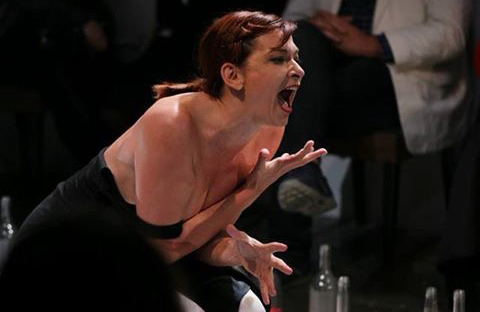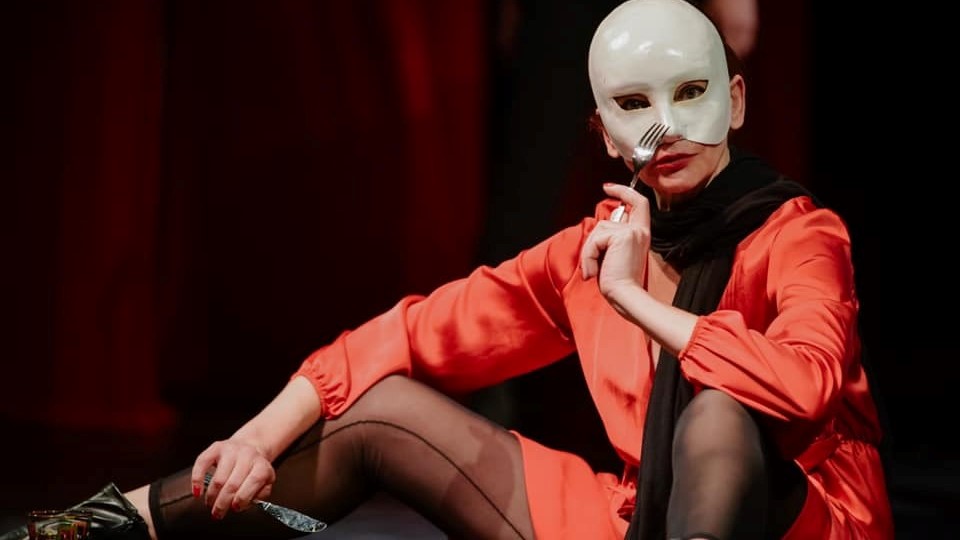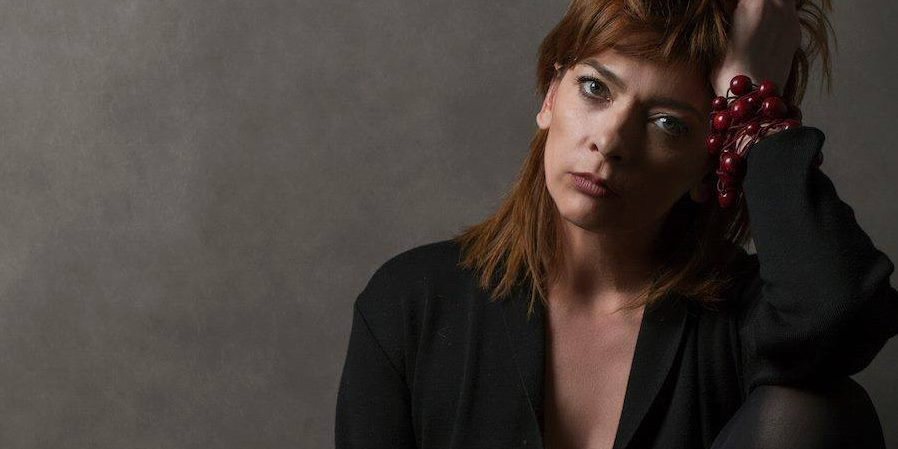Actress, director and producer Ema Andrea talks to Flamur Dardeshi about the realities of working as an independent artist in Albania
Flamur Dardeshi: Your most recent show Hello, I am Mephisto, just finished its run at the National Experimental Theater in Tirana. Were you pleased with the outcome?
Ema Andrea: The show ran for a month, from the end of December to the end of January, and this is one of our ongoing problems [in Albania]. Our institutions do not have a repertoire, nor is there the possibility of a post-production inclusion in the repertoire. A production that succeeds and provokes the public does not continue to be in the repertoire, despite serving its vision. As a result, Hello, I am Mephisto met the same fate, but I am hopeful it will attend festivals.
Yet we face challenges because not all festivals are financially supported, so we will probably have to co-finance the costs. Abroad it is easier because the Ministry of Culture will fund you if you attend prestigious festivals.
FD: What about here in Albania?
EA: Here it is such a long and tough odyssey, because there is no legal space, no such investment, and it is not in the mentality of those in charge, so it gets increasingly difficult.
For example, the play Mother and a Child, another collaboration I did with Dino Mustafić, won two awards at the Festival of International Alternative Theater – Fiat Montenegro (the Award for Best Direction and the Award for Best Actress). We then had a very difficult time with it, walking all year to other festivals, because one person cannot do all this. In our country quality things pass in silence, the frustration of ignorance persists.
FD: Some audience members walked out of Hello, I am Mephisto. How do you feel about this? Is this something you believe to be positive or negative for the show?
EA: It’s positive because it’s a show that lets you react freely, which I believe is the mark of a good show. It is not a show that is presented in such a way that you feel embarrassed to [walk] out or dislike it. Art, in my opinion, should shock you. And it’s very natural to refuse this provocation since it has taken you to a place where you don’t want to go.
I admire the audience member who has the courage to stand up and walk out during the show. The spectator can translate it as he pleases; someone claimed it was emotionally heavy, someone else said I wasn’t used to [this style of performance], and yet another said I came to laugh and have fun. And this is significant to me because it is through this lens that I interpret the concept of banality in the context of an audience that comes to the theater but does not really know the theater because they have been exposed to numerous banal performances.
FD: Is there a large audience for your performances?
EA: Our audience is confusing, as is our artistic feed. Many people confuse commercial performances with theater performances that have strong social themes. Both have their audiences, and in the case of the Albanian public, these groups of audiences are confusing.

Ema Andrea in Mother and Child
FD: You began your acting career as a movie actress. What distinguishes theater from film, and what is theater’s mission?
EA: Although the medium differs, both offer opportunities to enrich the human being as an individual and in the community. I disagree with the notion that art conveys messages; rather, art should provoke; it forces you to ask questions and, in general, it is quite easy for a human being to forget to ask questions. Art helps you think with your head, be empathetic, know characters, and know examples. To be aware of oneself. To know yourself. Which, in my opinion, is the most difficult journey.
In addition to this in theater, in a live spectacle, you have the good fortune to communicate with all human means, it is a form of human communication through art. Therefore, theater is always magical and live performances are the most beautiful communication of art. That is why I do not believe that the theater will ever die. Regardless of the ritual that is fading. Theater is a stroke of luck.
FD: What is it like to work as an independent artist in Albania and why did you make this choice?
EA: In truth, I’m not sure if I chose this path or it chose me. Now I can say that this has turned out to be quite lovely. At first, they did not accept me because I could not make compromises. Compromises that require you to lower your head and place yourself in a position of mercy and helplessness, so I chose to do my own theater because I cannot live without art. I do not sleep when I have an idea and I know it will be difficult to realize.
In the years when I started – 1994-95 – I did not even know what it meant to do independent theater, nor did I conceive what it means to do a project. I made mistakes at first, then sometimes someone supported me as I started to make my first shows, sometimes I made them completely without money. And I saw that I was successful.
I also studied abroad, I got a loan, I spent all my savings on experiences abroad until I was 40 years old. And when I came back and I wanted to share these experiences it was impossible because I had no one to talk to about them…no one with whom to discuss them…
FD: Has this been a lonely path?
EA: It is absolutely a lonely path. It continues to be. In Hello I am Mephisto I also bought the [props] and brought them to the theater with my car. It’s a lonely road and I believe I’m still alone. And the confirmation for what I was doing, the affirmation for my worth as an actress or director, came not from Albania, but from abroad. Then I said ‘yes,’ this is the way. Because I was frustrated, thinking I was doing something wrong because they didn’t accept me. And that has made me call myself an actress of the world regardless of the language I speak.
FD: Did the fact that you were a woman make it more difficult for you?
EA: Much more difficult. In addition to this, I am a divorced woman. You can imagine what a challenge it was! Add to that the fact that I am educated, speaks foreign languages, am intelligent and attractive. All of this is clear to me only now.
F.D: Do these qualities make it more difficult then?
E.A: These qualities, rather than paving the way for you, become an obstacle. Unfortunately, everyone in Albania wants to reinvent the wheel. Rather than collaborating, we bicker over who gets the credit.
FD: Is there a lack of collaboration?
EA: There are small banal clans. There is no willingness to talk about what could be done differently…

Ema Andrea in Hello, I am Mephisto
FD: Theaters in the region appear to cooperate to some level, but this does not appear to be the case in Albania.
EA: Our collaborations are spontaneous and based on personal connections, and then they end. It should actually be a round trip – not just because we know someone. Institutions should be in charge of communication; there should be a plan, a vision of cooperation that can be stretched beyond the staging of a show.
I adore Balkan theater, and whenever I visit Italy, I tell them: “You miss what the Balkans have; there is more drama, spontaneity, it isn’t perfect, and it goes to extremes.” I admire Balkan actors and the Balkan ethos of theater, and I think that an interchange, a collaboration between us, would be beneficial to theater.
FD: To be less robotic?
EA: That’s why I say it’s not perfect. It is less robotic; the mindset of Balkan actors, and of Balkan artists in general, is to give everything. We also have very dramatic stories; this is not to say that we should take advantage of our dramatic history; rather, it has made us more reflective, deeper, and sensitive people. We have things to say, and we’ve come to certain conclusions, at least internally, since we wanted to know why there was so much drama.
FD: But Albania continues to be somewhat detached from the Balkan theater scene…
EA: Yes, unfortunately it continues to be disconnected. Precisely because I had this feeling, I did an event called My name is Balkan. There were readings of all contemporary Balkan authors and the publication of a book, including all the authors. In fact, I did the work that the Ministry of Culture had to do, but the ministry deemed it insufficient as an event. Because I wanted to get to know each other; I wanted Tirana to be aware of what is going on in the Balkans, which I am sure they are unaware of. And the moment you know, you discover, maybe the desire to collaborate arises.
FD: The national theater building has been demolished for nearly two years. What happened, in retrospect?
EA: It’s a bit complicated. It was one of the first artistic gatherings, but apparently at the last moment. A community that has never stood up in protest for more humane working conditions. I would have liked that we rise up in protest and restructure the theater as an institution, and to restructure the role of the artist in the society. This is not happening and this hurts me more. Today there is a great silence for all of the theater’s concerns. We cannot have two standards: accepting mediocre art, compromising simply to get paid, accepting working in non-dignified conditions, bowing down to the director, bowing down to the minister..,
After giving birth to, serving, and admiring our executioner, we exclaim, “You are our Executioner!” The problem is that the institution is not functioning properly. The way it works is confusing. There is no artistic calendar for shows, there is nothing …
FD: Given all the difficulties you encountered along the way, how likely was it that you would give up? And how likely is it that other artists will give up their art at such moments?
EA: This is the exact structure I was talking about. We must create systems that enable artists to grow, prove their worth, and put themselves to the test. Despite the fact that art is an inner calling, a structure might assist you in recognizing it and making a more peaceful decision. Between financial independence and making an artistic career is a very strong and big choice. In addition to doing other kind of works, I also experienced hunger while having a child to take care of. Many young people today face such situations and make their own decisions.
I personally would have suffered if I had given up. I refused to surrender, that’s what happened to me. I did it unconsciously, but now I know what it is: not giving up.
That is why I have freedom when I do theater, because I earned it; no one gave it to me. And freedom is not something that is given to you; it is something you fight for.
Further reading: The demolition of the National Theatre of Albania
Flamur Dardeshi’s review of Hello, I am Mephisto
Flamur Dardeshi is a freelance writer based in Tirana. He has contributed in the areas of translation, analysis, and poetry. His main fields of interest are literature, cinematography, and theatre.








